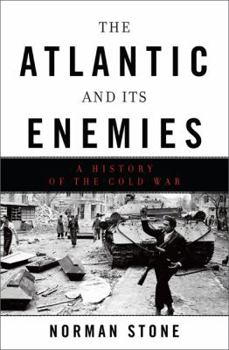The Atlantic and Its Enemies: A Personal History of the Cold War
Select Format
Select Condition 
Book Overview
After World War II, the former allies were saddled with a devastated world economy and traumatized populace. Soviet influence spread insidiously from nation to nation, and the Atlantic powers -- the... This description may be from another edition of this product.
Format:Hardcover
Language:English
ISBN:0465020437
ISBN13:9780465020430
Release Date:May 2010
Publisher:Basic Books (AZ)
Length:668 Pages
Weight:2.35 lbs.
Dimensions:2.1" x 6.6" x 9.3"
Age Range:18 years and up
Grade Range:Postsecondary and higher
Customer Reviews
4 ratings
An Economic War
Published by Thriftbooks.com User , 14 years ago
Instead of simplifying or healing, the Second World War created an environment that was incredibly complex. And yes, there were two broad ideologies that competed aggressively for converts and followers. Yet, The Atlantic and Its Enemies, demonstrates that the period called the Cold War was primarily an economic one. Stone covers all the events that has come to represent the era: The Marshall Plan, CIA/KGB games, Berlin tensions, the Korean and Vietnamese conflicts, the bomb and the pill, Watergate, the continuing impact of oil, SALT treaties, the growing influence of media, and more. He also spends a significant amount of time on the roles of Thatcher and Reagan along with the resurgence of Germany as a bridging theme of the period. The author has great style that has authority without coming across as a lecture. The work is nuanced and informative which results in a narrative with confidence and clarity. In addition to the insight that this was an economic war, Stone provides incredible facts I had not come across in other histories of the Cold War. These include: the Korean War was the event that created modern Europe, oppression at home and abroad contributed to the fall of the Soviet Union as that investment distorted production, and Khrushchev wanted to go back to the early policies of Lenin that included economic reform and flexibility with the West. As far-reaching and scary as the Cold War was (I was born in 1965 and was deeply troubled by nuclear war from the earliest age), Stone communicates a fond reminiscence for what now almost seems quaint as a new war with radical Islam wages. One contention I challenge from the author is his belief that the 1980's was the most fascinating post-war decade as I believe it was the 1970's when absolutely everything was in flux and economies around the world were battered and no lessons really learned.
Personalized history
Published by Thriftbooks.com User , 14 years ago
Norman Stone, love him or hate him, is a superb writer. When he calls this history of the post-1945 "personal," he isn't kidding. His likes: Turks, Jews, conservatives, Anglo-Saxons. His heroes: Churchill, Reagan, Thatcher. His dislikes: "professional" race advocates, pre-1945 Germans, Communists and fascists, most nationalists, pleaders for the Third World. His villains, or failures: Eden, Heath, Stalin and Mao, both Jimmy and Rosalynn Carter, terrorists in general, IRA and Arab specifically. He makes a few factual errors--- Calling Gen. Creighton Abrams "Adams," and stating Foster Dulles succeeded G.C. Marshall at the State Dept. while Dulles didn't take over until 1953. (Marshall gave way to Dean G. Acheson in 1949) He makes for controversy, relishes it, and is never dull.
somewhat disappointed
Published by Thriftbooks.com User , 14 years ago
I had great expectations for this book, based on a rave review in the Wall Street Journal, and I did indeed enjoy the opening chapters. Starting with the Vietnam War, however, Mr. Stone's account began to seem rather dubious. (The Viet Minh weren't called the Viet Cong; they were names for revolutionary groups in two different wars. Lots of niggling little stuff like that.) I was also disappointed to see that there is no bibliography and no source notes, only quotes from often-unnamed historians. Are we really supposed to take the whole thing on faith? If the publisher was reluctant to spend the extra money on say forty pages of back matter, why in the world didn't Mr. Stone post it online so the serious reader could discover the source of his information? For all we know, that unnamed historian is Noam Chomsky. If my opinion improves over the next hundred pages, I'll revise this review. Later: okay, I've bumped this book up to four stars. I like what Mr. Stone has to say about Margaret Thatcher and Ronald Reagan. I'm still reading, and will revise again if it's called for. Meanwhile, though, I wonder if your time and money wouldn't be better spent with John Lewis Gaddis's We Now Know: Rethinking Cold War History. Later still: I've now finished the book, though I must admit that I skipped a bit on the overlong exegesis on the virtues of Turkey. I see no reason to change my assessment, though if possible I'd drop the book to 3.5 stars. Blue skies! -- Dan Ford
Elegant, masterful.
Published by Thriftbooks.com User , 14 years ago
Norman Stone hits another home run out of the ballpark. Elegantly written, insights from a long career, fresh ideas that I've never encountered before in any other history of the period. As he says in his witty introduction, he's not a tractarian, and he puts you at ease from the start. This book isn't just for policy wonks. Nothing about it is pedestrian or confusing. It flows rather than marches. It's an enjoyable read, and well worth the price and worth your time.






